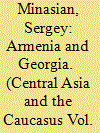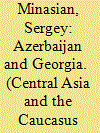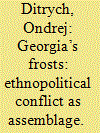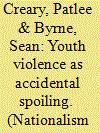| Srl | Item |
| 1 |
ID:
118728


|
|
|
|
|
| Publication |
2012.
|
| Summary/Abstract |
Relations between Armenia and Georgia go back many centuries into the history of these two neighboring nations. The recent history of their relations as two post-Soviet newly independent states is only two decades old, which means that certain problems have not yet been resolved.
Both countries have to cope with political, ethnopolitical, economic, linguistic, and religious problems; the situation in both countries is further complicated by the far from simple processes of nation-building and the countries' involvement in bloody ethnopolitical conflicts in the Caucasus. This has inevitably affected the political and socioeconomic development of both Armenia and Georgia.
|
|
|
|
|
|
|
|
|
|
|
|
|
|
|
|
| 2 |
ID:
134134


|
|
|
|
|
| Publication |
2014.
|
| Summary/Abstract |
The relations between Georgia and Azerbaijan are a key factor in regional politics and security in the Southern Caucasus. They strongly affect economic contacts and trade, as well as the implementation of all sorts of communication and energy projects. The two countries agree on many issues of regional policy, the way ethnopolitical conflicts should be settled, and the degree to which external actors could or should be involved. Turkey's presence in bilateral Georgian-Azeri relations is another important factor that may end in a geopolitical triangle of sorts in the Southern Caucasus. On the other hand, these relations cannot and should not be described as a formalized full-scale political, let alone, military-political alliance with corresponding mutual obligations. The author discusses these and other aspects of bilateral relations, assesses the prospects for further cooperation, and points to the possible challenges and problems that might crop up later.
|
|
|
|
|
|
|
|
|
|
|
|
|
|
|
|
| 3 |
ID:
163163


|
|
|
|
|
| Summary/Abstract |
This article is a reinterpretation of ‘frozen conflicts’ as assemblages binding together and strategically orienting a variety of components from both human and nonhuman estates at various scales in order to make a move toward ‘unfreezing’ their research. It then demonstrates how this perspective may be employed in the case of the ethnopolitical conflict in Georgia. The resulting analysis points to several important processes that animate the constant pulsation of the conflict field even when arms are calm and contribute to the dynamic and becoming nature of the conflict and its dynamic (re-)assembling. It illuminates how the visibility function of the assemblage operates and endows with meaning the structure of relations in the conflict field. It traces how the bricolage of Georgian social association transformed over time, notably under Saakashvili, and how it has also been a key element of statebuilding practice in the separatist entities. The analysis moreover demonstrates how the actual instantiations of collective violence form but a fraction of that which takes place in the conflict field, from other forms of political and criminal violence to regime change, state (un-)making through processes of contraction or extension of heterogenous, ‘hybrid’ governscapes including some distinctly virtual ones but betraying real political effects. Finally, it expounds how the ethnopolitical conflict assemblage affixes together a variety of agency from human agents to institutions from local to state governments or the international conflict resolution apparatus in addition to the material (nonhuman) actants enrolled in the translation networks populating the conflict field.
|
|
|
|
|
|
|
|
|
|
|
|
|
|
|
|
| 4 |
ID:
131990


|
|
|
|
|
| Publication |
2014.
|
| Summary/Abstract |
Northern Ireland's current period of relative peace and political stability has been varyingly attributed to large amounts of international economic development assistance and the funding of grassroots peacebuilding work. Yet the post-accord peace is punctuated by seemingly sporadic and isolated acts of violence perpetrated by young people. Using the concept of accidental spoiling, we analyze the perceptions of 120 community group leaders and international funding program administrators pertaining to the causes and effects of persistent sectarian violence among Northern Irish youth and the effect of that violence on the long-term sustainability of peace in Northern Ireland. The views shared by this cross-section of civil society groups suggest that, although economic development assistance has provided opportunities to decrease the inequalities that contributed to the ethnopolitical conflict, low self-esteem, and low self-image, disrupted communities continue to fuel youth interest in violence, thereby raising the potential to harm the peace process. The article concludes by proposing that deeper social reorganizing objectives should be aimed for if Northern Ireland is really to achieve conflict transformation.
|
|
|
|
|
|
|
|
|
|
|
|
|
|
|
|